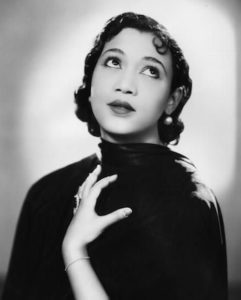
Elisabeth Welch
*Elisabeth Welch was born on this date in 1904. She was a Black chanteuse singer and dancer.
From New York City, her mother was from Scotland, and her father was of African and Native American descent. Welch’s career began as a child, singing in school productions and the choir at St. Cyprian's Episcopal Church. It was in 1923 that her choir was invited to sing in the Broadway production of “Runnin Wild.” Here she introduced the Charleston, a new dance to the tune of the same name. In 1928 she joined Lew Leslie's historic Blackbirds of 1928, where her co-stars were Bill 'Bojangles' Robinson, Aida Ward, and Adelaide Hall.
When the show transferred to Paris, all the Black artists became the toast of cafe society, beginning a new career for her in nightclubs and cabaret. By 1933 she had moved and settled in London, where she remained for more than 50 years. She established herself as one of the biggest stars of London nightlife throughout the thirties. Cole Porter wrote a part for her in Nymph Errant (1933), which also starred Gertrude Lawrence. Welch's number, Solomon, literally stopped the show and went on to become her signature tune. Later revues and musicals included Glamorous Night (1935), It's in the Bag (1937), Arc de Triomphe (1943), Tuppence Coloured (1947), Penny Plain (1951), and The Crooked Mile (1959).
Other songs with which she was associated, As Time Goes By, Love for Sale, and La Vie En Rose, have since become standards. During the Second World War, she entertained the troops in Gibraltar and the Middle East with stars like Edith Evans and John Gielgud. She also appeared at the London Palladium in Happy and Glorious from 1944 to 1946. Later stage appearances included playing the fairy godmother in Cindy-Ella (1962, revived 1963 and 1976), and in 1970 she starred in her one-woman show, A Marvellous Party (Hampstead Theatre Club). By the seventies, Welch had achieved a cult status with theatergoers.
A new and younger generation discovered her when she made a guest appearance (lying on a sofa) in the musical Pippin (1973), and once again, she stopped the show. Six years later, she gave one of the most remarkable performances of her career when she sang Stormy Weather in the offbeat film The Tempest. In 1985, while returning home, she was beaten up by a mugger but was back onstage the following day. Later the same year, a new one-woman show in New York, “Elisabeth Welch, A Time to Start Living,” won her an Obie Award.
Welch was one of the great survivors of show business; she virtually never stopped working. She made countless film, radio, and television appearances and recorded numerous albums, many of them classics. Throughout the eighties and nineties, she made triumphant appearances in Australia, Russia, and at New York's Carnegie Hall. One of her last public appearances was in 1992 when stars gathered at London's Lyric Theatre to pay tribute to her, and she was given five standing ovations. Her career spanned eight decades.
She also starred in many British movies in the 1930s, appearing alongside Paul Robeson and Rex Harrison. The African American actress and singer was one of the most redoubtable entertainers of the 20th century. Celebrated for her sultry singing voice, she was a great interpreter of popular songs. Her long career took her from New York's jazz-age theatre to Paris cabaret and numerous West End musicals and revues. Elisabeth Welch died in Denville Hall, Middlesex, on July 15, 2003, at age 99.
British Film Institute
21 Stephen Street
London
W1T 1LN